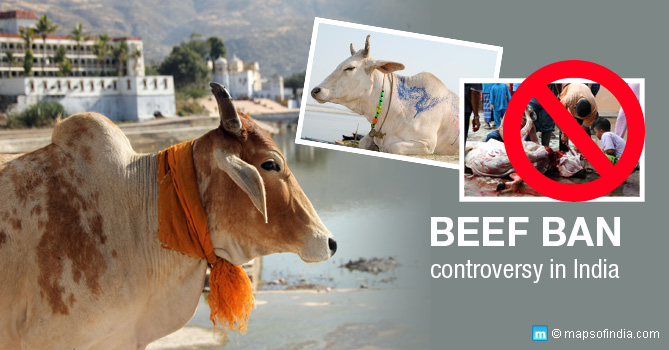Why ban beef?
The country is embroiled in a controversy regarding a ban on slaughter of cows and the sale and consumption of beef. In retrospect, this controversy has existed for many decades now. The reason is apparently simple. Hindus, who form the majority of the populace, consider the cow sacred. The cow, according to Hindu religious scriptures, is the embodiment of the Feminine Divine and motherhood. Slaughter of cows brings the greatest misfortune, Hindu religious leaders claim. An average Hindu, though far from being vegetarian, will abstain from consumption of beef. On the other hand, the Muslim and Christian minorities consume beef extensively. Since India gained independence from the British, there has been a demand for banning cow slaughter in the country and on consumption of beef. Successive governments have resisted any attempt to impose such a ban at a central level due to the secular nature of the country and its constitution. Some states, however, have succeeded in implementing local legislation banning cow slaughter. While this does not automatically translate into a beef consumption ban, it makes it difficult to legitimately source beef and beef products. The entire situation seems to be in stark contrast to one economic reality – India is the world’s second largest beef exporter, though most of the beef exported is buffalo meat.
Which states ban sale/consumption of beef?
Cow Slaughter Banned – In India, a number of states have legislation in place to ban the slaughter of cows. Now, in some of these states only slaughter of cow is prohibited which means buffaloes, bulls, bullocks, and other cattle may be slaughtered for consumption. In others, such as Punjab, Rajasthan, and Himachal Pradesh, slaughter of all forms of cattle may be banned. There is no nationwide ban on the consumption or sale of beef, allowing for import or sale and for restaurants to serve meat in most places except some places such as Maharashtra.
| States/UT which ban cow slaughter | |
| Andhra Pradesh | Madhya Pradesh |
| Bihar | Maharashtra |
| Chandigarh | Odisha |
| Delhi | Puducherry |
| Gujarat | Punjab |
| Haryana | Rajasthan |
| Himachal Pradesh | Tamil Nadu |
| Jammu & Kashmir | Telengana |
| Jharkhand | Uttar Pradesh |
| Karnataka | |
Apart from this, some places such as Goa, Daman and Diu etc. ban the slaughter of young cows but allow for old and sick cows. In yet other states such as Assam and West Bengal, slaughter houses need to obtain a “fit for slaughter” certificate for each cow before it is slaughtered. States such as Arunachal Pradesh, Kerala, Manipur, Meghalaya, Mizoram, Nagaland, Sikkim, and Tripura allow for slaughter of cows without the need for any certificate. Consumption of beef is highest among the north eastern states of India.
Dadri lynching incident
Beef has been at the heart of a heated controversy in India for many decades now. On 28 September 2015, a mob attacked a Muslim family in Dadri district, Uttar Pradesh, for alleged consumption of beef. Even as a violent mob, fanned by rumors of beef consumption by the Muslim family attacked and killed a 50-year-old man Mohammad Akhlaq Saifi, the nation watched on in stunned silence at the political drama that ensued. Apart from the murder and injuries sustained by Akhlaq’s 22-year-old son Danish, the incident deeply injured secular and humanitarian sentiments in the nation. Media reports and Social Media were full of protests against the incident and from what seems to be the conclusion, the incident had more to do with political vendetta than religious motivation.
Political background and protests
If the debate surrounding beef ban has been raging for many decades now, why has it been fueled now? The controversy has been rekindled by two states – Maharashtra and Jammu and Kashmir. Over seven months ago, the Maharashtra state legislature passed a law banning the possession and import of been, apart from slaughter itself. This outraged the Muslim community in the state which has been traditionally dealing with beef trade and is the largest consumer of beef in the region as well. Allegations are that the ruling party in the state, BJP, was pushed to ban beef by the right-wing organization, Rashtriya Swayamsevak Sangh (RSS), a staunchly Hindu group. The RSS has also been accused of fanning mob sentiments in the Dadri lynching incident, though RSS activists staunchly deny any involvement.
Jammu and Kashmir is another state where a ban on cow slaughter and sale of beef has been the matter of a raging controversy, given that the state has a considerable Muslim population. Much disruption of the state assembly’s autumn session proceedings can be attributed to the differences between politicians regarding the beef ban. Following the terrible controversy in the state, the assembly, and in the media, the High Court of Jammu and Kashmir constituted a 3-member Bench to hear a petition against the beef ban in the state on 16 October 2015. Ultimately the matter boils down to the politicizing of a ban that should be tackled on more sensitive notes.
Mahatma Gandhi on beef ban
In the wake of the Dadri killing, many media houses have dug up Mahatma Gandhi’s views about the demand for a beef ban dating back to the times of the Constituent Assembly. Gandhiji was of the view that the matter of a beef ban had no place in the Constituent Assembly and no legislation should be passed in this regard. Mahatma Gandhi was of the opinion that the values of religious freedom as enshrined in the establishment of an independent India would not be real if there is any coercion in the form of a ban on slaughtering cows. While it is true that cow is sacred to the Hindu religion, freedom to consume beef must be allowed for the sentiments of those who practice other religions as well. Only then will India be a truly secular and inclusive nation.
Much of Mahatma Gandhi’s views have been distorted and misquoted in recent times; however, it remains undeniable that despite a deep dedication to serve the cow and all that it represents to a Hindu, he was against passing a legislation banning cow slaughter.
Recent Updates
- On 27 October 2015, about 20 police officers entered Kerala House in Delhi after a call and complain from Vishnu Gupta, a Hindu Sena leader. Gupta complained that the canteen at the guest house serves beef. However, the authorities at the canteen said they only serve buffalo meat and not beef. The issue resulted in a political fight as many ministers opposed the act. After the complain, the ‘beef fry’ was removed from the menu. Followed by protests, the beef dish was resumed to the menu on 28 October 2015.
- On 16 October 2015, a 20-year-old boy was killed in Himachal Pradesh by a group of people suspecting him to be a cattle smuggler for cow slaughter. However, according to the police, the young man was transporting five cows and ten bulls on a truck to Saharanpur district, Uttar Pradesh.
15 chargesheeted for Dadri killing
The police chargesheet regarding the mob lynching of a Muslim man (Mohammad Akhlaq) in Dadri, Uttar Pradesh mentions the names of 15 people, including the son of a BJP politician. The point to note here is that the entire chargesheet has no mention of the word ‘beef’. Instead, there is reference to “a particular type of meat” that was found at the victim’s house. Danish, the son of Akhlaq informed the police that a majority of attackers were known to his family.
Read Also:
Should There Be a Nationwide Ban on Slaughter of Cows?
Beef on the Platter!
Beef politics begins to singe Bihar
Is Most of India Vegetarian? – An Infographic
Is it a Totalitarian Democracy? Threat to Freedom of Speech in India





